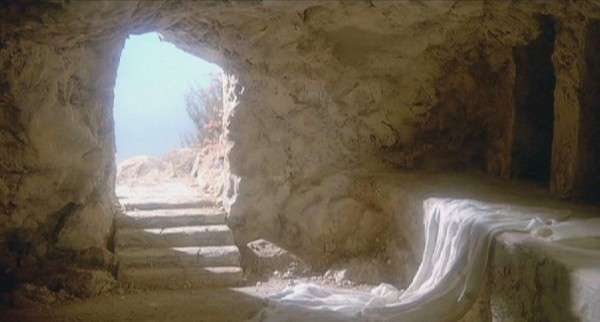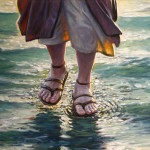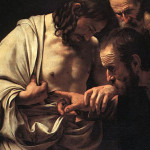Is It Reasonable to Believe in Miracles?
by Karlo Broussard
Filed under Belief

Should I believe in miracles? This question doesn’t pertain to whether I should believe in this miracle or that miracle. It has to do with whether I’m rationally justified in believing in miracles as such.
David Hume's Wisdom for the Wise
The eightenth-century Scottish skeptic philosopher David Hume argued the wise man should not believe in miracles. The basis for his assertion was what might be called the “repeatability principle”—evidence for what occurs over and over (the regular) always outweighs evidence for that which does not (the rare). Since miracles are rare and contradict our uniform experience, Hume argues the wise man ought never to believe in miracles.
While it’s true that a wise man should base his belief on the weight of evidence, it’s not true that evidence for uniform experience always outweighs evidence for what is singular and rare.
We know this for several reasons, but I’ll give you four.
Why Uniform Experience Doesn't Make Belief in Miracles Irrational
First, if Hume’s principle concerning uniform experience were correct, then we would have to deny many things we hold as true. For example, the Big Bang was a singular event that is unrepeatable. Have you experienced any Big Bangs lately? I would also venture to say you haven’t experienced anybody landing on the moon in recent times.
Now, if we hold to Hume’s principle, it would be irrational to believe the scientific account of the Big Bang and the historical fact that Neil Armstrong walked on the moon, since these occurrences contradict our uniform experience. But this is absurd. The Big Bang is one of the most rigorously established theories in all of science, and all who are not obsessed with conspiracy theories hold Neil Armstrong’s walk on the moon is a historical fact.
Moreover, Hume’s principle nullifies science itself. As an inductive discipline, science necessarily presupposes the possibility of discovering new things that may contradict uniform experience. Scientific laws are revised all the time based on new contrary evidence. But if Hume’s principle were correct, scientists would never have reasonable grounds to revise laws, and thus replacing the Newtonian view of the universe with Einstein’s view would have been irrational. No skeptic can hold this and still be seen as intellectually credible.
A third reason why Hume’s argument from uniform experience fails is that it sets the standard for authenticating a miracle too high. It views rarity as that which disqualifies rational belief, yet rarity is of the essence of a miracle. A miracle, by definition, is an unusual event, something contrary to the ordinary course of things. So, according to Hume’s view, every miracle is disqualified from the start, because every miracle is a rare event.
This is analogous to making a fifty-foot bar the qualifying height for a good high jumper, when no jumpers can even clear an eight-foot bar. It is simply unreasonable to set a standard so high that no one can ever reach it. If skeptics desire Christian beliefs to be subject to falsification, then they ought not set standards where Christian beliefs cannot be proven true.
A fourth critique of Hume’s argument is it commits the fallacy of special pleading, a fallacy in which one deliberately ignores aspects unfavorable to his point of view. Hume is basing his argument on his experience, or perhaps the experiences of those he knows. Perhaps there were people in Hume’s time, or even people of the past, whose common experience involved miracles. This is precisely the claim of the early Christians. While Hume is within his rights to speak authoritatively about his own experience, he cannot do so with regard to others. His own uniform experience cannot be used to exclude the testimony of another person’s experience.
The Improbable is Too High a Hurdle to Jump
A skeptic may not articulate his or her skepticism about miracles as does Hume but simply might express the inability to overcome the hurdle of accepting something so improbable. A skeptic might say, “The miracles in the Bible are just too far-fetched for me to believe—a man rising from the dead? Blind people seeing? You expect me to believe that?”
While I can sympathize with someone who has a healthy skepticism when it comes to improbable events, we can’t reject something outright simply because it’s improbable.
First, an event might be improbable when considered relative to our general background knowledge, but, relative to other specific knowledge or evidence, improbability can decrease.
For example, it’s highly improbable that the winning number for the California Lottery would be 6345789. If the newspaper, however, says this is the winning number, then the probability changes, making the odds for it being the winning number higher. Furthermore, if the news anchor broadcasts it as the winning number on the nightly news, then the odds for it being the winning number become even higher.
Similarly, miracles, like Jesus rising from the dead, are improbable relative to our background knowledge—men don’t usually rise from the dead. But the improbability decreases when it’s considered relative to specific evidence, namely, eyewitness testimonies. If the testimonies are sound, then belief is rational despite the event’s improbability.
A second response to help a skeptic overcome the high hurdle of a miracle’s improbability is Hume’s principle:
"[N]o testimony is sufficient to establish a miracle, unless the miracle be of such a kind, that its falsehood be more miraculous, than the fact, which it endeavors to establish." (David Hume, Of Miracles).
Many skeptics consider only how improbable a miracle is but hardly ever consider the improbability of a miracle not occurring despite the testimony.
Take for example the Resurrection of Jesus, to which the early Christians testified. Skeptics rightfully consider this event as improbable and are rational when they exercise caution concerning the testimonies of it. But very seldom do skeptics consider how improbable the alternative explanations are.
For example, it’s much more improbable that the early Christians stole the body and lied about the Resurrection only to gain death. People don’t die for what they know to be a lie. Furthermore, it’s highly unlikely the apostles would give simple, nondramatic accounts—not to mention giving women the role as first witnesses—if they were lying about the Resurrection.
Another improbable alternative to the literal Resurrection of Jesus is that the Christians hallucinated. It’s improbable because St. Paul records Jesus appearing to many different people on several different occasions as well as appearing to more than 500 disciples at the same time (see 1 Cor. 15:6)—occurrences not typical of hallucinations.
So, when facing the obstacle of improbability, the question should not be “Should I believe in miracles as such?” but “Is there sufficient evidence to believe this or that miracle?” If the evidence for a particular miracle is trustworthy—say, the resurrection of Jesus—then belief in that miracle would be reasonable, even though it’s an improbable event.
The wise man surely needs to exercise caution when confronted with accounts of the miraculous. But the wise man should also be open to following the evidence where it leads, no matter how extraordinary and improbable it is.
Related Posts
Note: Our goal is to cultivate serious and respectful dialogue. While it's OK to disagree—even encouraged!—any snarky, offensive, or off-topic comments will be deleted. Before commenting please read the Commenting Rules and Tips. If you're having trouble commenting, read the Commenting Instructions.












